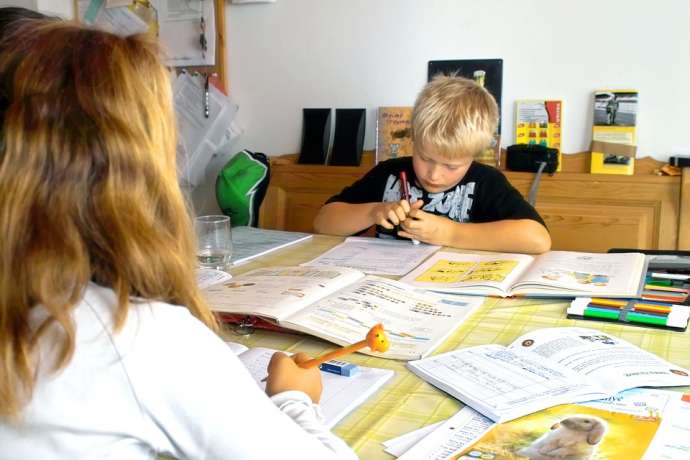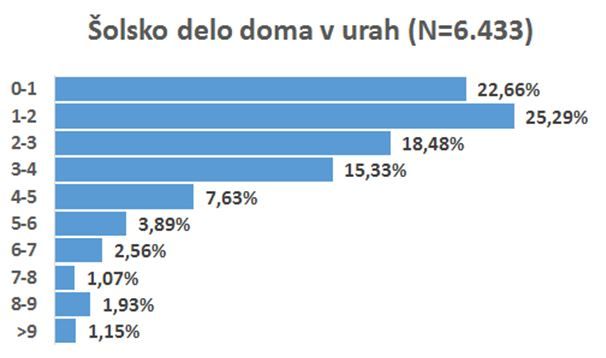Časoris is an online newspaper aimed at children. Each week we’ll take an article and post it here as a Slovene-English dual text.
Domače Naloge in Prosti Čas
Homework and Free Time
Written by Sonja Merljak Zdovc, translated by JL Flanner & G Translate
Šola je že skoraj zaprla vrata za dobra dva meseca.
School is almost over for the next two months.
Marsikje zadnje dneve pouka namenjajo potepanju po domačem kraju ali širši okolici, za tabore ali pa za sproščeno zabavo na šolskem igrišču.
Many of the last days of school are devoted to travelling around the countryside or wider area, going to camps, or having relaxing fun on the school playground.
Domače naloge in popoldansko delo za šolo so že daljna preteklost, saj imate učenci ocene že zaključene.
Homework and afternoon work for school are in the distant past, as students have already completed their grades.
Ali pač? V Zvezi aktivov svetov staršev Slovenije (ZASSS) še niso pozabili na delo za šolo, ki ga otroci opravite doma.
Or have they? The Association of Parents of the Parents of Slovenia (ZASSS) has not yet forgotten the work for the school that you take home.
Predstavili so izsledke raziskave, ki so jo opravili med starši osnovnošolcev.
The results of research carried out by parents of elementary school students have been presented.
In kaj so ugotovili?
And what did they find?
»Anketa je pokazala, da le dobra petina učencev opravi vse domače naloge, učenje in drugo delo za šolo, v manj kot eni uri. Četrtina jih potrebuje za to uro do dve, slaba petina dve do tri ure. Približno petnajst odstotkov otrok potrebuje kar tri do štiri ure, preostala petina pa celo več kot štiri ure,« pravi dr. Anton Meden, predsednik ZASSS.
"The survey showed that only just over a fifth of students do all homework, learning and other work for the school in less than an hour. A quarter of them need up to two hours for this, one-fifth between two to three hours. Approximately fifteen percent of children need about three to four hours, while the remaining fifth even more than four hours," says Dr. Anton Meden, President of ZASSS.
Šolsko delo doma v urah. Vir: ZASSS / School work at home in hours. Source: ZASSS
Domače naloge so namenjene ponavljanju snovi, kar je za učenje koristno, meni Meden, saj možgani s ponavljanjem znanje utrdijo.
Homework is intended for repetition of content, and this is useful for learning, says Meden, since the brain gains knowledge by repeating it.
»A razlike v obsegu domačega dela so velike. Družinam, kjer otroci za to porabijo veliko časa, zmanjka časa za druge dejavnosti. V veliki večini primerov za pomoč šolarjem poskrbijo družinski člani. Iz nekaterih povezav med podatki pa lahko sklepamo, da imajo učenci, ki jim starši doma ne morejo pomagati, slabše ocene.«
"And the differences with regard to homework are great. Families where children spend a lot of time for this run out of time for other activities. In the vast majority of cases, family members help schoolchildren. By examining the data we can conclude that pupils whose parents cannot help them parents have worse grades. "
Anketa, ki so jo med osnovnošolci opravili v Zavodu za šolstvo, je pokazala nekoliko drugačne podatke.
A survey, which was carried out among primary school students by the Institute of Education, showed slightly different data.
Po njihovih podatkih za domače naloge porabi večina (55,9 odstotka) učencev do 30 minut, nadaljnjih 29,3 odstotka pa do ene ure. Za učenje porabi 64,3 odstotka učencev do ene ure dnevno, izjema je učenje pred testi, ko se učijo dlje.
According to their data for homework, the majority (55.9 percent) of pupils spend up to 30 minutes, followed by 29.3 percent up to one hour. With regard to studying, 64.3 percent of pupils spend up to 1 hour a day, except for before tests when they study more.
Read more stories and improve your Slovene at Časoris, while all our dual texts can be found here.








